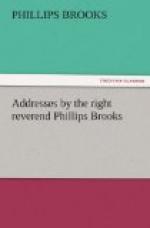men of liberty, of how the Old Testament, the great
picture which forever shines, is the emancipator,
leading forth out of imprisonment the people of God,
who were to do the great work of God in the very much
larger and freer life in which they were to live?
The prophet, the psalmist, are ever preaching and
singing about liberty, the enfranchisement of the life
of man, that man was not imprisoned in order to fulfil
himself, but shall open his life, and every new progress
shall be into a new region of existence which lie
has not touched as yet. When we turn from the
Old Testament to the New Testament, how absolutely
clear that idea is! Christ is the very embodiment
of human liberty. In His own personal life and
in everything that He did and said, He was forever
uttering the great gospel that man, in order to become
his completest, must become his freest, that what
a man did when he entered into a new life was to open
a new region in which new powers were to find their
exercise, in which he was to be able to be and do
things which he could not be and do in more restricted
life. It is the acceptance of that idea, it seems
to me, that makes us true disciples of Christ and
of that great gospel, and that transfigures everything.
When my friend turns over some new leaf, as we say,
and begins to live a new life, what shall we think
of him? I learn that he has become a Christian
man, that he is doing something, that he is working
in a way and living a life which I have not known
before. What is my impression in regard to him?
Is not your impression, as you look upon that man,
that somehow or other he has entered into a slavery
or bondage, that he has taken upon his life restrictions
and imprisonments which he did not have before?
And you think of him, perhaps, as a man who has done
a wise and prudent thing, who has done something that
is going to be for his benefit some day in some distant
and half-realized world, but as a man who, for the
present, has laid a burden and bondage upon his life.
That is never the tone of Christ; it is never the
tone of the Christian gospel. When a man turns
away from his sins and enters into energetic holiness,
when a man sacrifices his own self-indulgence and
goes forth a pure servant of his God and his fellow-men,
there is only one cry in the whole gospel of that man,
and that is the cry of freedom. As soon as he
can catch that, as soon as I can feel about my friend,
who has become a better man, that he has become a
larger and not a smaller, a freer and not a more imprisoned
man, as soon as I lift up my voice and say that the
man is free, then I understand him more fully, and
he becomes a revelation to me in the higher and richer
life which is possible for me to live. But think
of it for yourselves, for a moment, and ask what freer
life really is. Try to give a definition of liberty,
and I know not what it can be said to be except something
of this kind: Liberty is the fullest opportunity
for man to be and do the very best that is possible




